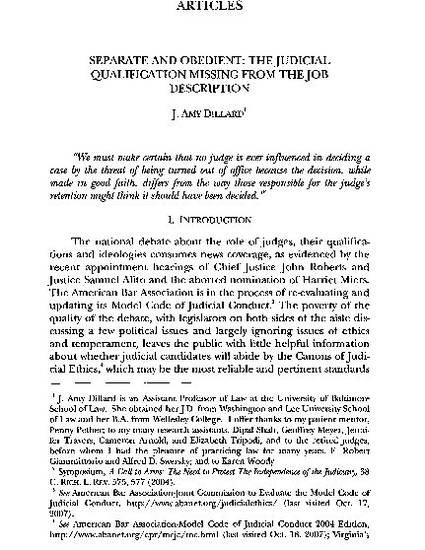
The national debate about the role of judges, their qualifications and ideologies consumes news coverage, as evidenced by the recent appointment hearings of Chief Justice John Roberts and Justice Samuel Alito and the aborted nomination of Harriet Miers. The American Bar Association is in the process of re-evaluating and updating its Model Code of Judicial Conduct. The poverty of the quality of the debate, with legislators on both sides of the aisle discussing a few political issues and largely ignoring issues of ethics and temperament, leaves the public with little helpful information about whether judicial candidates will abide by the Canons of Judicial Ethics, which may be the most reliable and pertinent standards for evaluating judicial temperament and aptitude. Legislators demonstrate discomfort with the power of judges, and they boldly seek to limit the power of the judiciary and to circumscribe the offices of Article III judges. Congress has at least threatened legislation to impeach judges, create term-limits, and reduce the number of appeals judges. Despite the rhetoric to abandon the use of a litmus test for judicial candidates, it remains apparent on the federal stage that legislators are, even if subconsciously, using one.
In Virginia, legislators openly apply a litmus test in the selection and reappointment processes for judges. With absolute control over the selection and reappointment process for all judges in the Commonwealth, members of the Virginia General Assembly, in session with no oral or written record and no method for capturing legislative history, increasingly ask pointed ideological questions to scrutinize judges who are carrying out their jobs ethically, in accordance with the law, and with courage. Virginia's original constitution granted control of the judiciary to its General Assembly. Throughout the 19th century, during two significant revisions of the Virginia Constitution, the General Assembly retained its complete control over the selection and reappointment of every judge in the Commonwealth. Today, the General Assembly maintains absolute control of the Commonwealth's Judiciary. As recently as 1970, the Commonwealth reviewed and retained her unique practice of granting absolute control over the judiciary to the General Assembly.
The problem of selecting and applying a litmus test is not exclusive to Virginia, but the unique appointment process creates a vortex of power for legislators to disable judges who take unpopular stands. If the point of appointing judges is to free them from populist criticism at the ballot box, then Virginia has not accomplished her goal. In fact, legislators confront judges in closed hearings with no transcript for their constituents, thus making it easier to confront judges with frank and base political criticism, bypassing the need for true assessment of performance and criteria based on judicial ethics, ability, and temperament.
The General Assembly maintains no legislative history or record of its proceedings. The history and process of judicial selection are entirely secret in Virginia, save for a few tenacious reporters' recollections. Accordingly, the data for this article is generally ephemeral, comprising newspaper articles and interviews with judges and other direct participants. Though my methodology is somewhat unconventional, it is the only approach I have discovered to obtain the information.
